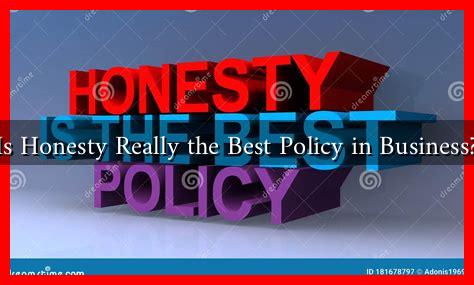-
Table of Contents
Is Honesty Really the Best Policy in Business?
In the fast-paced world of business, the question of whether honesty is truly the best policy often arises. While some may argue that a little deception can lead to greater profits, the long-term benefits of honesty cannot be overlooked. This article explores the significance of honesty in business, supported by examples, case studies, and statistics that highlight its importance.
The Foundation of Trust
Honesty is the cornerstone of trust, which is essential for any successful business relationship. When companies are transparent in their dealings, they foster a culture of trust among employees, customers, and stakeholders. Trust leads to:
- Increased Loyalty: Customers are more likely to remain loyal to brands that they perceive as honest and transparent.
- Better Employee Morale: Employees who work in an environment of honesty are generally more satisfied and engaged.
- Stronger Partnerships: Business partners are more inclined to collaborate with companies that demonstrate integrity.
For instance, a study by the Harvard Business Review found that companies with high levels of trust outperform their competitors by 286% in terms of total return to shareholders. This statistic underscores the financial benefits of maintaining honesty in business practices.
The Risks of Dishonesty
While some businesses may resort to dishonest practices for short-term gains, the risks associated with such behavior can be detrimental. Dishonesty can lead to:
- Legal Consequences: Misleading advertising or fraudulent practices can result in lawsuits and hefty fines.
- Reputation Damage: Once a company is labeled as dishonest, it can take years to rebuild its reputation.
- Loss of Customers: Consumers are increasingly aware and sensitive to corporate ethics; dishonesty can drive them away.
A notable example is the case of Enron, which was once one of the largest energy companies in the world. The company’s executives engaged in widespread accounting fraud, leading to its bankruptcy in 2001. This scandal not only resulted in significant financial losses but also destroyed the trust of investors and employees alike.
Honesty in Marketing
In marketing, honesty is particularly crucial. Consumers today are more informed and skeptical than ever. They have access to vast amounts of information and can easily verify claims made by companies. Therefore, businesses that prioritize honesty in their marketing strategies tend to perform better. Key points include:
- Authenticity: Brands that communicate authentically resonate more with consumers.
- Transparency: Providing clear information about products and services builds credibility.
- Social Responsibility: Companies that are honest about their practices and impact on society attract socially conscious consumers.
For example, Patagonia, an outdoor clothing brand, has built its reputation on honesty and environmental responsibility. Their commitment to transparency about their supply chain and environmental impact has garnered a loyal customer base and increased sales.
Creating a Culture of Honesty
To foster a culture of honesty within an organization, leaders must lead by example. Here are some strategies to promote honesty:
- Open Communication: Encourage employees to voice their opinions and concerns without fear of retribution.
- Accountability: Hold everyone in the organization accountable for their actions, regardless of their position.
- Training: Provide training on ethical decision-making and the importance of honesty in business.
Companies like Johnson & Johnson have successfully implemented these strategies, particularly after the Tylenol crisis in the 1980s, where they prioritized consumer safety and transparency, ultimately restoring their brand’s reputation.
Conclusion
In conclusion, honesty is indeed the best policy in business. While the temptation to engage in dishonest practices may arise, the long-term benefits of maintaining integrity far outweigh any short-term gains. By fostering a culture of honesty, businesses can build trust, enhance their reputation, and ultimately achieve greater success. As the business landscape continues to evolve, the importance of honesty will remain a critical factor in sustainable growth and success.

